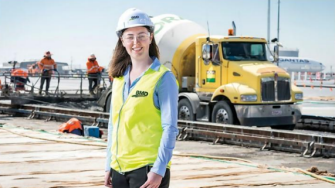
-
A placement relevant to a students your program or specialisation in a conventional professional engineering workplace. This is generally where significant technical engineering tasks related to the Engineers Australia (EA) Stage 1 Competencies are undertaken.
A paid placement must be approved by UNSW Engineering Industrial Training.
- Students must undertake at least 30 days of traditional industrial training
- A minimum of 10 days can be counted as one placement
- Be supervised by a qualified Engineer and paid
Traditional Industrial Training can be in the form of:
- Technical engineering tasks
- Engineering-related tasks (office or field-based activities that solve engineering problems)
- Engineering consulting. This includes working for professional engineering service firms who provide independent services, expertise and technical advice
- Industry-based research and development
-
UNSW Engineering encourages students to undertake paid placements. However, it is recognised that in some extenuating circumstances, students find an opportunity that they want to pursue.
An unpaid placement must be approved by UNSW Engineering Industrial Training before a student commences.
· Students must undertake at least 30 days of traditional industrial training
· 60 days can be counted towards the program requirement
· Cannot remain in the placement beyond your required 60 days
· A minimum of 10 days can be counted as one placement
· Be supervised by a qualified Engineer
· Demonstrate that the role allows a student to achieve the learning objectives of industrial training
· Students must not be completing work that simply assists with the ordinary operation of the business or organisation
For further information, refer to the Fair Work Ombudsman.
Insurance
If a copy of the UNSW Certificate of Currency for Personnel Accident and Public Liability, is required email unpaidit@unsw.edu.au
- Students are advised to contact UNSW Insurance Department to ensure that you are covered by the correct insurance.
- UNSW provides Public Liability and General Personal accident insurance
-
A non-traditional placement can be a student project at UNSW, a program or course or collaboration with a 3rd party provided. Students are where are exposed to engineering-related tasks and technical skills. UNSW source real-world projects related to Engineering that are approved for up to 30 days to count towards a students 60-day Industrial Training requirement.
Key Points
- A maximum of 30 days non-traditional can be counted towards your 60-day industrial training requirement
- Two placements can be undertaken as non-traditional
- A minimum of 5 days can be counted as one placement
- Be supervised by a qualified Engineer
-
Students are required to provide the below information in their application for approval of their Industrial Training Placement
Confirmation of employment
A letter, email, or contract (on company letterhead). Examples are:
- Offer letter on company letterhead
- Email offer (email must be from the company email with company logo in the signature)
- Employment contract
Job description
A job description is a document that outlines specific activities, tasks, and duties that the student will be undertaking. This includes design, analysis, and experimental skills that you'll be exposed to during their placement. It should demonstrate that the work being undertaken is relevant to an accredited UNSW engineering program and allows the student to meet Engineers Australia Stage 1 Competencies.
The job description must be written by the employer. You may also provide a project outline or other information that supports the job description that must be on company letterhead. Or from a company email with the company logo in the signature.
Work Integrated Learning (WIL) Agreement
The WIL Agreements sets out UNSW WIL core terms. This is to be completed for each placement undertaken and signed by a UNSW authorised office and the Host Organisation.
Risk Assessment Form
The Risk Assessment Form must be completed to identify any potential hazards and control the risk of undertaking a placement. It must be signed by you and your workplace supervisor.
-
Overseas placements are a great way for students to gain International Engineering experience. International students can undertake an internship in their home country or any other country. Please be aware that workplace employment laws and safety standards differ from country to country.
An overseas UNSW WIL Agreements aim to ensure students are adequately supported whilst undertaking an overseas placement.
Students must seek travel approval by completing a Travel risk assessment and register their travel with UNSW pre-departure
-
If students have completed 60 days of industrial training at a previous institution or worked in industry prior to enrolling at UNSW, they are eligible for Recognition of prior work experience. This experience must have been:
- Completed within the last two years prior to commencing their current program of study
- Completed full 60 days
- Relevant to their program of specialisation
- Supervised by a qualified Engineer.
